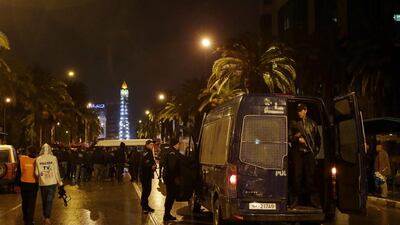TUNIS // Beji Caid Sebsi, the Tunisian president, declared a nationwide state of emergency and a curfew in the capital after a bomb attack on a presidential guard bus killed at least 12 people on Tuesday.
A security source at the site said “most of the agents who were on the bus are dead” after the attack in Tunis, which has become a target of jihadist violence since the 2011 revolution.
No group immediately claimed responsibility for the bombing, which a ministry official said also wounded 20 people when it went off on Mohamed V Avenue, just as this year’s 26th Carthage Film Festival was in full swing.
Mr Caid Sebsi, who cancelled a trip to Switzerland, declared a state of emergency throughout the country and a curfew in the capital.
“As a result of this painful event, this great tragedy ... I proclaim a state of emergency for 30 days under the terms of law and a curfew in greater Tunis from 9pm until 5am tomorrow,” he said in brief televised address.
Presidential spokesman Moez Sinaoui, who described the bombing as an “attack”, said the curfew would stay in place until further notice.
An AFP journalist on the scene saw the partly burnt-out shell of the bus, along with police, ambulances and fire engines.
A bank employee working nearby reported hearing a large explosion and seeing the bus on fire.
Carthage Film Festival director Brahim Letaief cancelled the night’s screenings, saying he hoped the showcase for African and Arab film-makers could resume on Wednesday.
“That is the only way to respond to these barbaric acts,” he said.
Prime minister Habib Essid and Najem Gharsalli, the interior minister, visited the scene of the blast.
The United States condemned the attack and offered to help the Tunisian authorities with their investigation.
US Secretary of State John Kerry “was proud to stand with Tunisian leaders earlier this month in Tunis and reaffirm our countries’ extensive economic, governance, and security cooperation”, a spokesman for his department said.
The UN Security Council urged its members to help bring the perpetrators to justice, adding that “no terrorist attack can reverse the path of Tunisia towards democracy and its efforts towards economic recovery”.
Tunisia has been plagued by Islamist violence since the 2011 overthrow of longtime dictator Zine El Abidine Ben Ali, and dozens of members of the security forces have also been killed.
Two attacks this year claimed by the Islamic State group targeted foreigners — at the National Bardo Museum in March, killing 21 tourists and a policeman, and at a resort hotel in Sousse in June, killing 38 tourists.
A state of emergency was imposed after the Sousse killings and later renewed before being lifted at the beginning of October.
* Agence France-Presse

